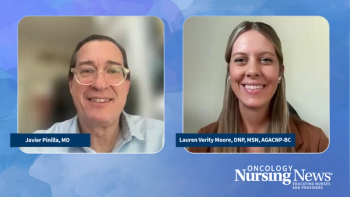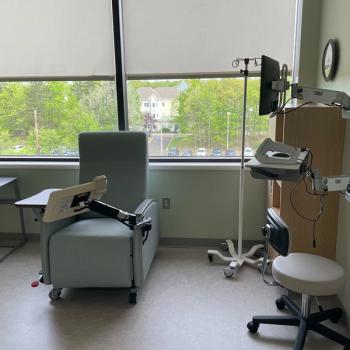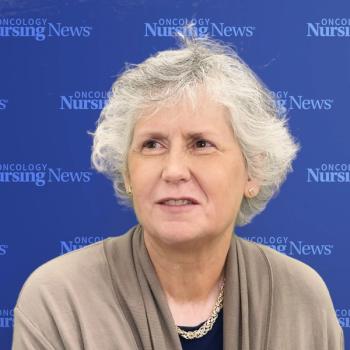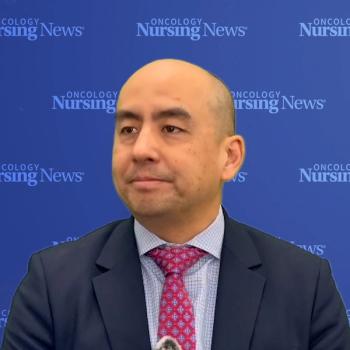
Panelists discuss the EMERALD trial data, which shows the effectiveness of elacestrant in patients with estrogen receptor 1 (ESR1) mutations, particularly those who were on first-line CDK 4/6 inhibitors for longer than a year.

Panelists discuss the EMERALD trial data, which shows the effectiveness of elacestrant in patients with estrogen receptor 1 (ESR1) mutations, particularly those who were on first-line CDK 4/6 inhibitors for longer than a year.

Patients with HR-positive, HER2-negative metastatic breast cancer should be consistently tested for ESR1 mutations to inform next lines of therapy.

Panelists discuss how innovative approaches to symptom monitoring incorporate multifaceted technology and team-based strategies, including electronic patient-reported outcome tools integrated with electronic medical record (EMR) systems, dedicated nurse coordinators for regular check-ins, specialized pharmacy services for medication education, and a comprehensive team approach involving various health care professionals to maintain consistent communication, ensure proper follow-up, and address potential barriers to adherence ranging from adverse effects to social and financial issues.

Panelists discuss how the new nilotinib formulation offers improved convenience by eliminating fasting requirements which may enhance adherence, while emphasizing that clinicians should remain flexible in their approach to tyrosine kinase inhibitor (TKI) selection since individual patient responses vary, trying supportive care and dose modifications before switching medications, but ultimately being willing to consider alternative TKIs when adverse effects cannot be adequately managed.

A nurse practitioner gives her advice for managing adverse events during treatment with talquetamab for multiple myeloma.

Panelists discuss the importance of using liquid biopsy for detecting estrogen receptor 1 (ESR1) mutations rather than relying on archival tissue testing.

Panelists discuss how molecular testing and liquid biopsies are crucial for tracking estrogen receptor 1 (ESR1) mutations in patients with metastatic breast cancer, particularly as a mechanism of resistance to aromatase inhibitor treatment.

The extended injection time for subcutaneous daratumumab in those with myeloma can serve as an opportunity for oncology nurses to check in with patients.

Panelists discuss how managing common adverse events associated with tyrosine kinase inhibitors (TKIs) such as nilotinib requires proactive strategies including supportive medications, dose adjustments, monitoring for gastrointestinal (GI) symptoms, rashes, elevated liver enzymes and glucose metabolism changes, and encouraging patients to maintain ongoing care with their primary care providers for comorbid conditions that could exacerbate potential cardiovascular risks.

Panelists discuss how simpler treatment regimens with fewer restrictions, such as the new nilotinib formulation without fasting requirements, can improve the chronic myeloid leukemia (CML) management approach by making medication adherence easier for patients, while acknowledging that even with improved formulations, all drugs still have potential adverse effects that require ongoing education and support, particularly for patients who may need lifelong therapy rather than achieving treatment-free remission.

Infusion bays designed with nurse input provide patients the choice between privacy and community while allowing support from loved ones.

Panelists discuss how health care providers can promote medication adherence by moving beyond labeling patients as noncompliant, instead investigating root causes such as adverse effects, financial toxicity, or forgetfulness, while emphasizing the importance of building trusting relationships, involving caregivers as accountability partners, and creating personalized solutions that address each patient's specific barriers to maintaining their treatment regimen.

Panelists discuss how medication adherence significantly impacts chronic myeloid leukemia (CML) treatment outcomes, with research showing even small differences between 90% and 95% adherence to tyrosine kinase inhibitor (TKI) therapy can substantially affect molecular response rates, particularly during the critical first year of treatment, which largely determines future outcomes including potential treatment-free remission.

Subcutaneous daratumumab makes treatment a faster and more tolerable process for patients with multiple myeloma, according to an expert.

Panelists discuss how patient education plays a crucial role in ensuring adherence to tyrosine kinase inhibitor (TKI) therapy by building trust through clear explanations of medications and expected adverse effects, tailoring information to individual patients, involving caregivers when appropriate, and emphasizing that education must continue throughout the patient's lifelong treatment journey as part of a collaborative team approach.

Panelists discuss how establishing trust and open communication with patients with chronic myeloid leukemia (CML) is crucial for treatment adherence, emphasizing the importance of asking specific questions about adverse effects rather than general inquiries, acknowledging that patients may feel reluctant to mention problems due to feeling "blessed" to have life-saving medication, and ultimately ensuring these conversations happen to prevent routine visits from missing quality-of-life issues.

Nurse practitioners and physician assistants can advocate to play a number of roles in oncology research, including primary investigators.

Panelists discuss how advanced practice providers (APPs) implement effective monitoring strategies for patients with chronic myeloid leukemia (CML), including regular check-ins after starting new medications such as nilotinib, encouraging patients to maintain symptom journals, and providing holistic care that addresses both physical symptoms and emotional well-being to help patients successfully navigate life with a chronic disease.

Panelists discuss how advanced practice providers (APPs) serve as crucial touchpoints throughout the journey of patients with chronic myeloid leukemia (CML), offering more accessible communication, early identification of adverse effects, medication management support, and integration of comprehensive supportive care services that collectively reduce emotional and logistical stress while improving overall quality of life.

Clinical trials can provide patients with myeloproliferative neoplasms expanded treatment options.

According to a nurse practitioner who works in myeloma research, nurses and APPs are responsible for much of the clinical work with patients involved in trials.

Panelists discuss how cardiovascular toxicity remains a significant concern with certain tyrosine kinase inhibitors (TKIs) used in chronic myeloid leukemia (CML) treatment, particularly with the older nilotinib formulation that showed increased cardiotoxicity in long-term trials, though it remains unclear whether this was directly related to poor adherence to fasting guidelines or inherent to the medication's pharmacological properties.

Panelists discuss how eliminating the strict mealtime restrictions with the new nilotinib formulation addresses a significant unmet need in chronic myeloid leukemia (CML) treatment by reducing disruption to patients' daily lives, potentially improving medication adherence and overall quality of life for patients who otherwise face a normal life expectancy when their condition is properly controlled.


The intersection of cardiology and oncology is greater than nurses and providers may assume, explained 2 experts.

Danielle Fournier, DNP, APRN, AGPCNP-BC, AOCNP, discusses the role of oncology nurses in genomic testing.

Nurse practitioners should listen to patients’ concerns and be ready with questions when it comes to germline testing, according to an expert.

Panelists discuss how the new FDA-approved formulation of nilotinib offers significant advantages over the original version by eliminating fasting requirements, potentially improving patient adherence while maintaining efficacy and reducing the risk of toxicity-related complications such as glucose metabolism issues, elevated cholesterol, and pancreatitis.

Oncology nurses and APPs can enhance patients’ comfort by counseling patients on what integrative care is and working to make those options accessible.

Panelists discuss how chronic myeloid leukemia (CML) treatment has evolved over the past 5 years, highlighting advancements in tyrosine kinase inhibitor (TKI) therapy, improved adverse effect management, tailored treatment approaches through molecular monitoring, and increased emphasis on shared decision-making with patients.